Advanced Sociology of Sports and Exercise: A Marxist Perspective
VerifiedAdded on 2022/12/30
|14
|4188
|68
Essay
AI Summary
This essay delves into the application of Marxism to the sociology of sports and exercise. It begins with a critical evaluation of Marxist theory, focusing on concepts like class relations and the influence of economic factors. The essay then examines the utility of Marxism in understanding sports, including the interplay of production, consumption, and social identity. Specific examples, such as the baseball industry in the Dominican Republic, are used to illustrate how sports are intertwined with socio-political and economic structures. The essay also explores how Marxism explains the impact of sports on social status, solidarity, and the influence of capitalism, leisure, and revenue generation within the sports industry. The analysis covers topics such as the roles of the Bourgeoisie and Proletariat classes, the impact of sports on social exclusion and discrimination, and the relationship between sports and pleasure.
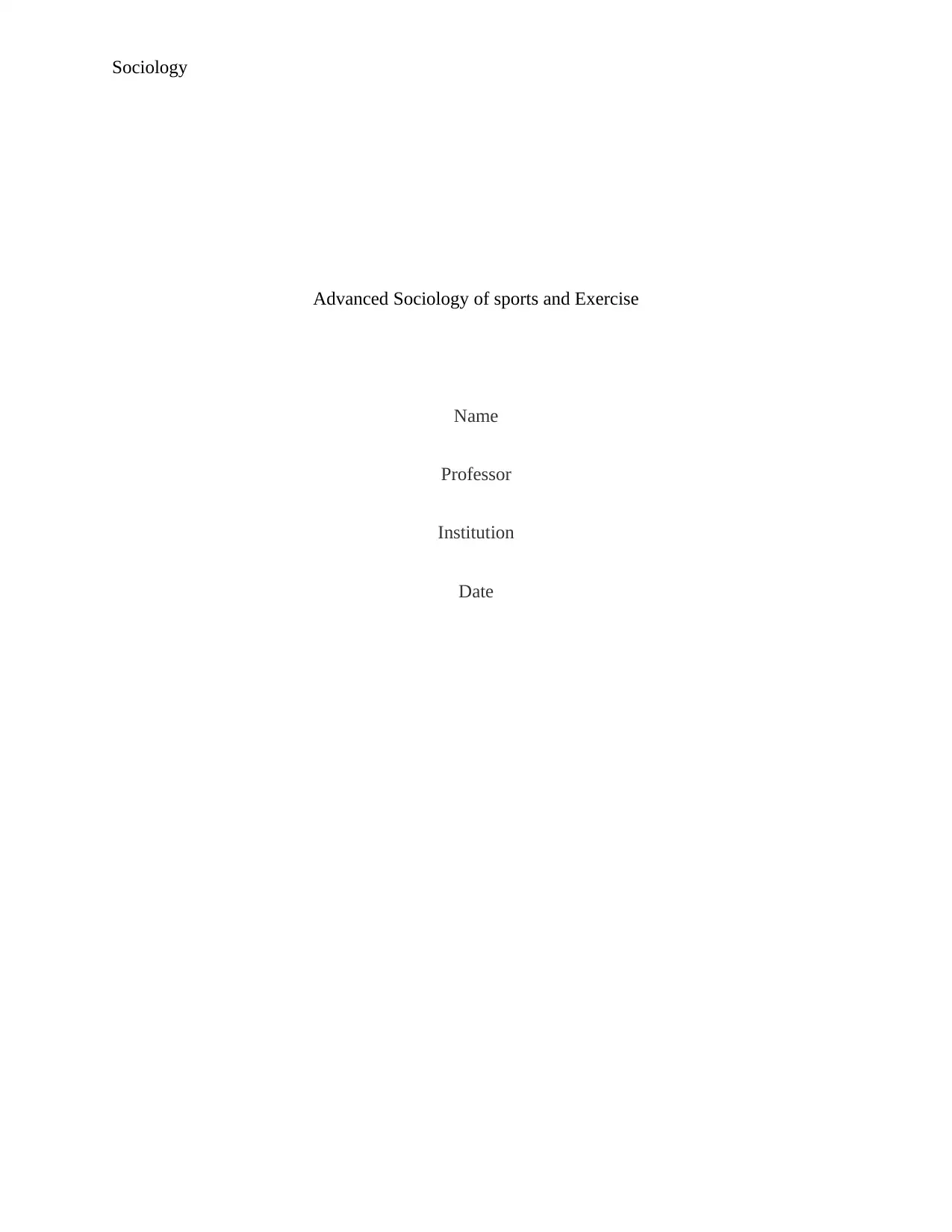
Sociology
Advanced Sociology of sports and Exercise
Name
Professor
Institution
Date
Advanced Sociology of sports and Exercise
Name
Professor
Institution
Date
Paraphrase This Document
Need a fresh take? Get an instant paraphrase of this document with our AI Paraphraser
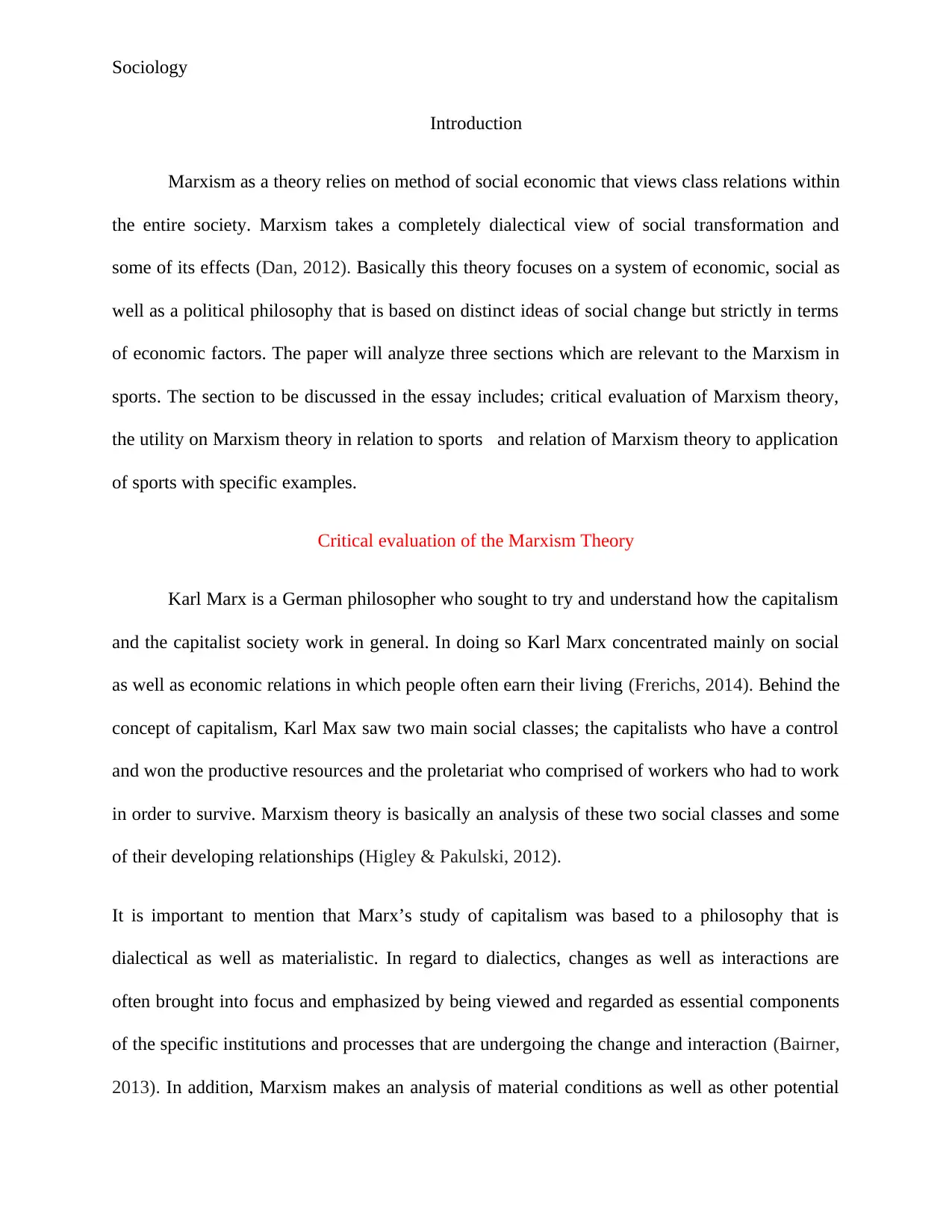
Sociology
Introduction
Marxism as a theory relies on method of social economic that views class relations within
the entire society. Marxism takes a completely dialectical view of social transformation and
some of its effects (Dan, 2012). Basically this theory focuses on a system of economic, social as
well as a political philosophy that is based on distinct ideas of social change but strictly in terms
of economic factors. The paper will analyze three sections which are relevant to the Marxism in
sports. The section to be discussed in the essay includes; critical evaluation of Marxism theory,
the utility on Marxism theory in relation to sports and relation of Marxism theory to application
of sports with specific examples.
Critical evaluation of the Marxism Theory
Karl Marx is a German philosopher who sought to try and understand how the capitalism
and the capitalist society work in general. In doing so Karl Marx concentrated mainly on social
as well as economic relations in which people often earn their living (Frerichs, 2014). Behind the
concept of capitalism, Karl Max saw two main social classes; the capitalists who have a control
and won the productive resources and the proletariat who comprised of workers who had to work
in order to survive. Marxism theory is basically an analysis of these two social classes and some
of their developing relationships (Higley & Pakulski, 2012).
It is important to mention that Marx’s study of capitalism was based to a philosophy that is
dialectical as well as materialistic. In regard to dialectics, changes as well as interactions are
often brought into focus and emphasized by being viewed and regarded as essential components
of the specific institutions and processes that are undergoing the change and interaction (Bairner,
2013). In addition, Marxism makes an analysis of material conditions as well as other potential
Introduction
Marxism as a theory relies on method of social economic that views class relations within
the entire society. Marxism takes a completely dialectical view of social transformation and
some of its effects (Dan, 2012). Basically this theory focuses on a system of economic, social as
well as a political philosophy that is based on distinct ideas of social change but strictly in terms
of economic factors. The paper will analyze three sections which are relevant to the Marxism in
sports. The section to be discussed in the essay includes; critical evaluation of Marxism theory,
the utility on Marxism theory in relation to sports and relation of Marxism theory to application
of sports with specific examples.
Critical evaluation of the Marxism Theory
Karl Marx is a German philosopher who sought to try and understand how the capitalism
and the capitalist society work in general. In doing so Karl Marx concentrated mainly on social
as well as economic relations in which people often earn their living (Frerichs, 2014). Behind the
concept of capitalism, Karl Max saw two main social classes; the capitalists who have a control
and won the productive resources and the proletariat who comprised of workers who had to work
in order to survive. Marxism theory is basically an analysis of these two social classes and some
of their developing relationships (Higley & Pakulski, 2012).
It is important to mention that Marx’s study of capitalism was based to a philosophy that is
dialectical as well as materialistic. In regard to dialectics, changes as well as interactions are
often brought into focus and emphasized by being viewed and regarded as essential components
of the specific institutions and processes that are undergoing the change and interaction (Bairner,
2013). In addition, Marxism makes an analysis of material conditions as well as other potential
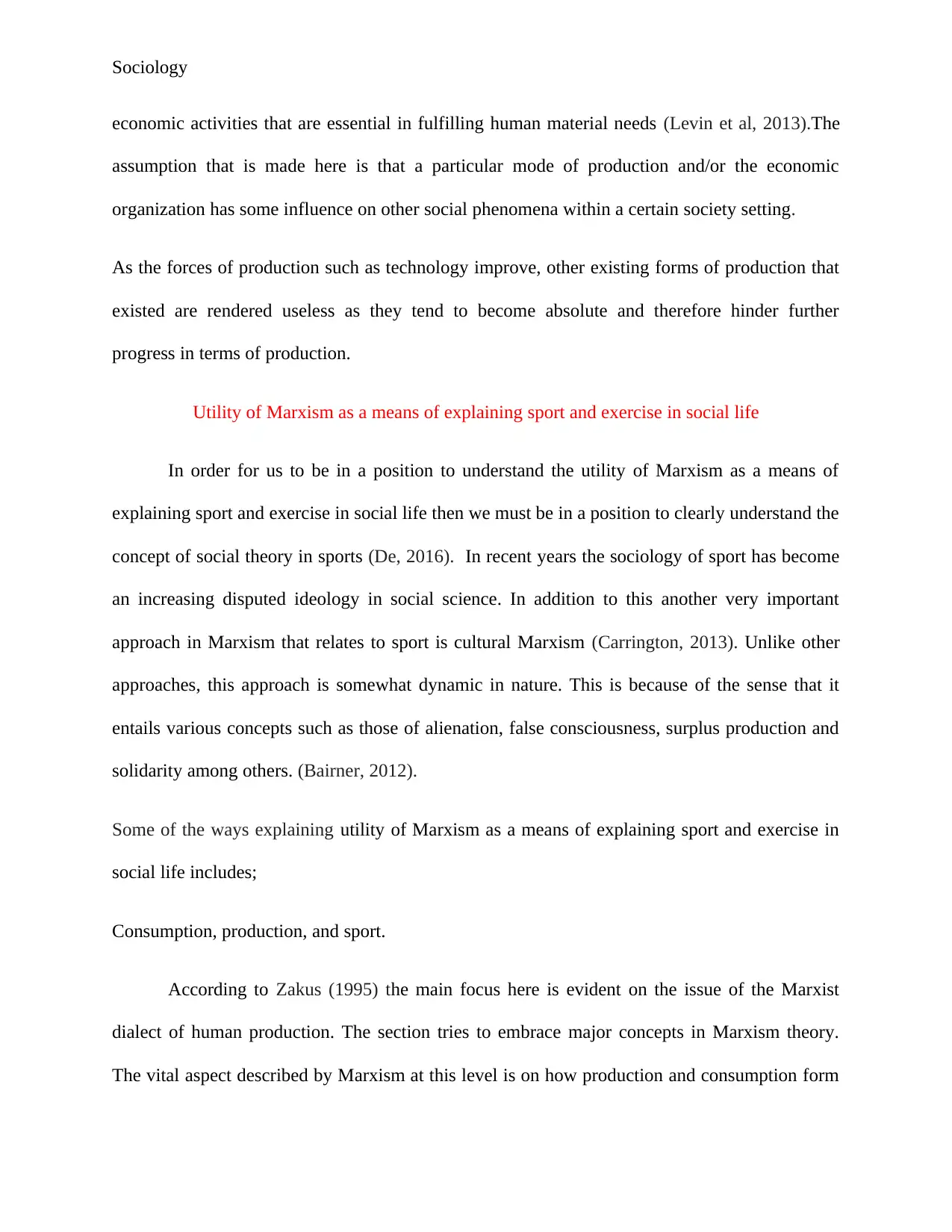
Sociology
economic activities that are essential in fulfilling human material needs (Levin et al, 2013).The
assumption that is made here is that a particular mode of production and/or the economic
organization has some influence on other social phenomena within a certain society setting.
As the forces of production such as technology improve, other existing forms of production that
existed are rendered useless as they tend to become absolute and therefore hinder further
progress in terms of production.
Utility of Marxism as a means of explaining sport and exercise in social life
In order for us to be in a position to understand the utility of Marxism as a means of
explaining sport and exercise in social life then we must be in a position to clearly understand the
concept of social theory in sports (De, 2016). In recent years the sociology of sport has become
an increasing disputed ideology in social science. In addition to this another very important
approach in Marxism that relates to sport is cultural Marxism (Carrington, 2013). Unlike other
approaches, this approach is somewhat dynamic in nature. This is because of the sense that it
entails various concepts such as those of alienation, false consciousness, surplus production and
solidarity among others. (Bairner, 2012).
Some of the ways explaining utility of Marxism as a means of explaining sport and exercise in
social life includes;
Consumption, production, and sport.
According to Zakus (1995) the main focus here is evident on the issue of the Marxist
dialect of human production. The section tries to embrace major concepts in Marxism theory.
The vital aspect described by Marxism at this level is on how production and consumption form
economic activities that are essential in fulfilling human material needs (Levin et al, 2013).The
assumption that is made here is that a particular mode of production and/or the economic
organization has some influence on other social phenomena within a certain society setting.
As the forces of production such as technology improve, other existing forms of production that
existed are rendered useless as they tend to become absolute and therefore hinder further
progress in terms of production.
Utility of Marxism as a means of explaining sport and exercise in social life
In order for us to be in a position to understand the utility of Marxism as a means of
explaining sport and exercise in social life then we must be in a position to clearly understand the
concept of social theory in sports (De, 2016). In recent years the sociology of sport has become
an increasing disputed ideology in social science. In addition to this another very important
approach in Marxism that relates to sport is cultural Marxism (Carrington, 2013). Unlike other
approaches, this approach is somewhat dynamic in nature. This is because of the sense that it
entails various concepts such as those of alienation, false consciousness, surplus production and
solidarity among others. (Bairner, 2012).
Some of the ways explaining utility of Marxism as a means of explaining sport and exercise in
social life includes;
Consumption, production, and sport.
According to Zakus (1995) the main focus here is evident on the issue of the Marxist
dialect of human production. The section tries to embrace major concepts in Marxism theory.
The vital aspect described by Marxism at this level is on how production and consumption form
⊘ This is a preview!⊘
Do you want full access?
Subscribe today to unlock all pages.

Trusted by 1+ million students worldwide
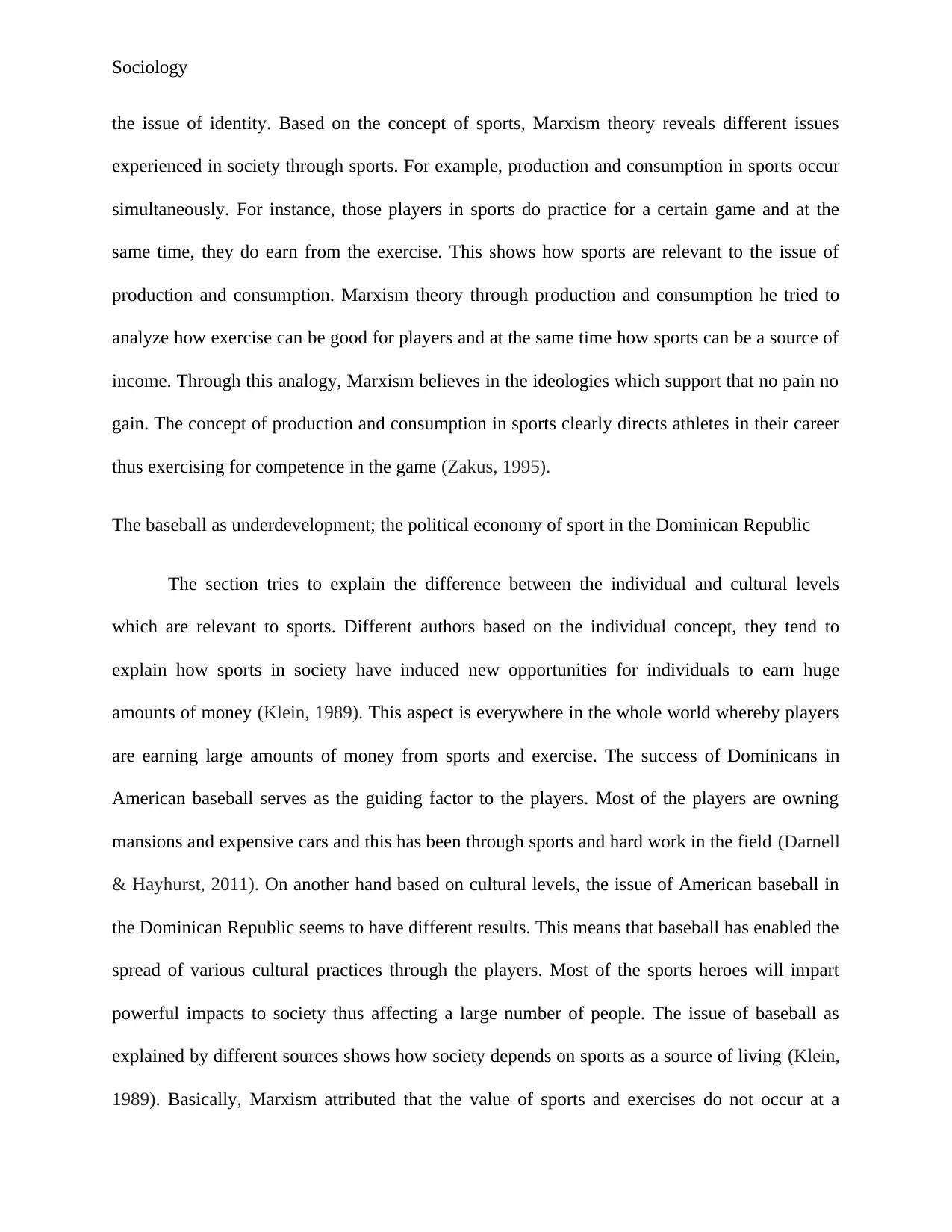
Sociology
the issue of identity. Based on the concept of sports, Marxism theory reveals different issues
experienced in society through sports. For example, production and consumption in sports occur
simultaneously. For instance, those players in sports do practice for a certain game and at the
same time, they do earn from the exercise. This shows how sports are relevant to the issue of
production and consumption. Marxism theory through production and consumption he tried to
analyze how exercise can be good for players and at the same time how sports can be a source of
income. Through this analogy, Marxism believes in the ideologies which support that no pain no
gain. The concept of production and consumption in sports clearly directs athletes in their career
thus exercising for competence in the game (Zakus, 1995).
The baseball as underdevelopment; the political economy of sport in the Dominican Republic
The section tries to explain the difference between the individual and cultural levels
which are relevant to sports. Different authors based on the individual concept, they tend to
explain how sports in society have induced new opportunities for individuals to earn huge
amounts of money (Klein, 1989). This aspect is everywhere in the whole world whereby players
are earning large amounts of money from sports and exercise. The success of Dominicans in
American baseball serves as the guiding factor to the players. Most of the players are owning
mansions and expensive cars and this has been through sports and hard work in the field (Darnell
& Hayhurst, 2011). On another hand based on cultural levels, the issue of American baseball in
the Dominican Republic seems to have different results. This means that baseball has enabled the
spread of various cultural practices through the players. Most of the sports heroes will impart
powerful impacts to society thus affecting a large number of people. The issue of baseball as
explained by different sources shows how society depends on sports as a source of living (Klein,
1989). Basically, Marxism attributed that the value of sports and exercises do not occur at a
the issue of identity. Based on the concept of sports, Marxism theory reveals different issues
experienced in society through sports. For example, production and consumption in sports occur
simultaneously. For instance, those players in sports do practice for a certain game and at the
same time, they do earn from the exercise. This shows how sports are relevant to the issue of
production and consumption. Marxism theory through production and consumption he tried to
analyze how exercise can be good for players and at the same time how sports can be a source of
income. Through this analogy, Marxism believes in the ideologies which support that no pain no
gain. The concept of production and consumption in sports clearly directs athletes in their career
thus exercising for competence in the game (Zakus, 1995).
The baseball as underdevelopment; the political economy of sport in the Dominican Republic
The section tries to explain the difference between the individual and cultural levels
which are relevant to sports. Different authors based on the individual concept, they tend to
explain how sports in society have induced new opportunities for individuals to earn huge
amounts of money (Klein, 1989). This aspect is everywhere in the whole world whereby players
are earning large amounts of money from sports and exercise. The success of Dominicans in
American baseball serves as the guiding factor to the players. Most of the players are owning
mansions and expensive cars and this has been through sports and hard work in the field (Darnell
& Hayhurst, 2011). On another hand based on cultural levels, the issue of American baseball in
the Dominican Republic seems to have different results. This means that baseball has enabled the
spread of various cultural practices through the players. Most of the sports heroes will impart
powerful impacts to society thus affecting a large number of people. The issue of baseball as
explained by different sources shows how society depends on sports as a source of living (Klein,
1989). Basically, Marxism attributed that the value of sports and exercises do not occur at a
Paraphrase This Document
Need a fresh take? Get an instant paraphrase of this document with our AI Paraphraser
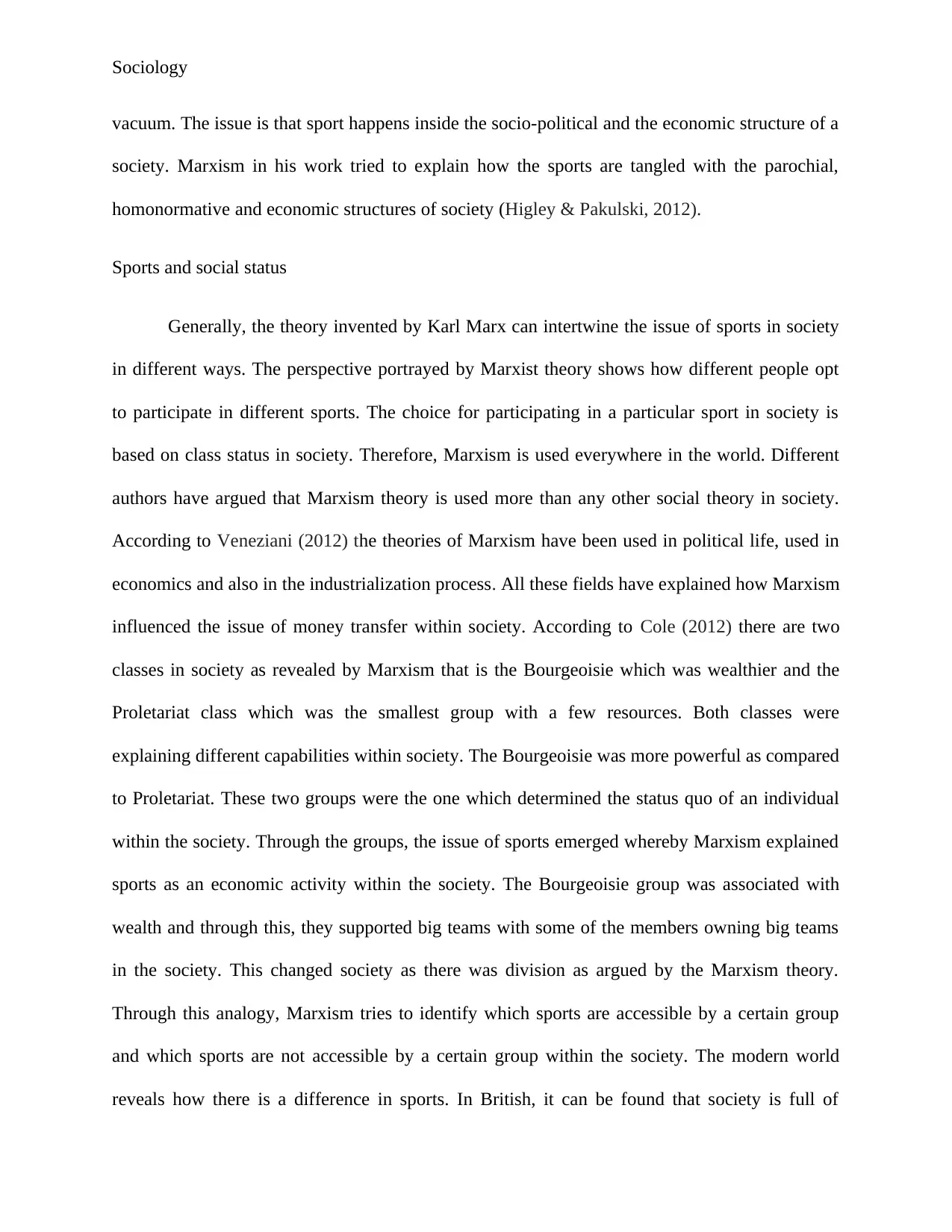
Sociology
vacuum. The issue is that sport happens inside the socio-political and the economic structure of a
society. Marxism in his work tried to explain how the sports are tangled with the parochial,
homonormative and economic structures of society (Higley & Pakulski, 2012).
Sports and social status
Generally, the theory invented by Karl Marx can intertwine the issue of sports in society
in different ways. The perspective portrayed by Marxist theory shows how different people opt
to participate in different sports. The choice for participating in a particular sport in society is
based on class status in society. Therefore, Marxism is used everywhere in the world. Different
authors have argued that Marxism theory is used more than any other social theory in society.
According to Veneziani (2012) the theories of Marxism have been used in political life, used in
economics and also in the industrialization process. All these fields have explained how Marxism
influenced the issue of money transfer within society. According to Cole (2012) there are two
classes in society as revealed by Marxism that is the Bourgeoisie which was wealthier and the
Proletariat class which was the smallest group with a few resources. Both classes were
explaining different capabilities within society. The Bourgeoisie was more powerful as compared
to Proletariat. These two groups were the one which determined the status quo of an individual
within the society. Through the groups, the issue of sports emerged whereby Marxism explained
sports as an economic activity within the society. The Bourgeoisie group was associated with
wealth and through this, they supported big teams with some of the members owning big teams
in the society. This changed society as there was division as argued by the Marxism theory.
Through this analogy, Marxism tries to identify which sports are accessible by a certain group
and which sports are not accessible by a certain group within the society. The modern world
reveals how there is a difference in sports. In British, it can be found that society is full of
vacuum. The issue is that sport happens inside the socio-political and the economic structure of a
society. Marxism in his work tried to explain how the sports are tangled with the parochial,
homonormative and economic structures of society (Higley & Pakulski, 2012).
Sports and social status
Generally, the theory invented by Karl Marx can intertwine the issue of sports in society
in different ways. The perspective portrayed by Marxist theory shows how different people opt
to participate in different sports. The choice for participating in a particular sport in society is
based on class status in society. Therefore, Marxism is used everywhere in the world. Different
authors have argued that Marxism theory is used more than any other social theory in society.
According to Veneziani (2012) the theories of Marxism have been used in political life, used in
economics and also in the industrialization process. All these fields have explained how Marxism
influenced the issue of money transfer within society. According to Cole (2012) there are two
classes in society as revealed by Marxism that is the Bourgeoisie which was wealthier and the
Proletariat class which was the smallest group with a few resources. Both classes were
explaining different capabilities within society. The Bourgeoisie was more powerful as compared
to Proletariat. These two groups were the one which determined the status quo of an individual
within the society. Through the groups, the issue of sports emerged whereby Marxism explained
sports as an economic activity within the society. The Bourgeoisie group was associated with
wealth and through this, they supported big teams with some of the members owning big teams
in the society. This changed society as there was division as argued by the Marxism theory.
Through this analogy, Marxism tries to identify which sports are accessible by a certain group
and which sports are not accessible by a certain group within the society. The modern world
reveals how there is a difference in sports. In British, it can be found that society is full of
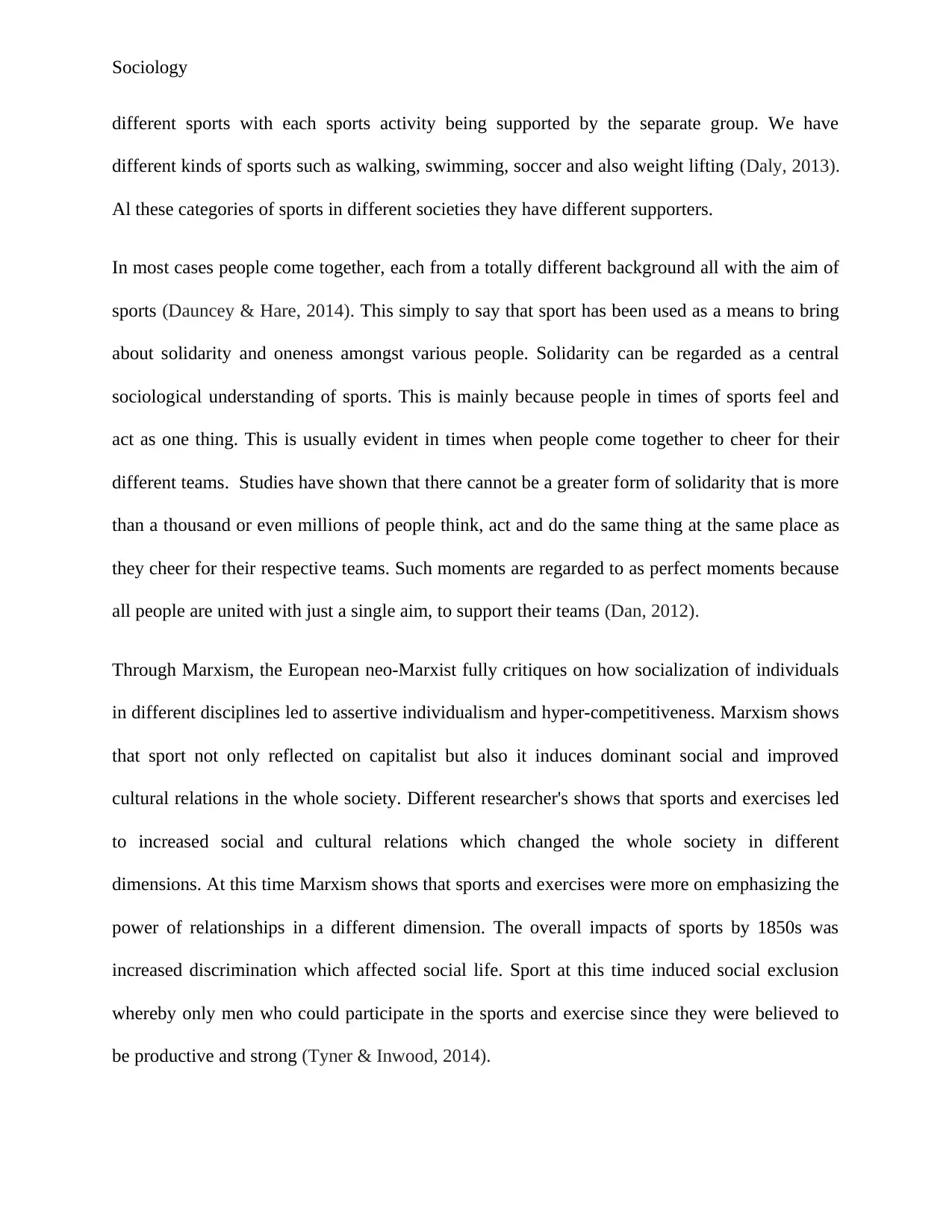
Sociology
different sports with each sports activity being supported by the separate group. We have
different kinds of sports such as walking, swimming, soccer and also weight lifting (Daly, 2013).
Al these categories of sports in different societies they have different supporters.
In most cases people come together, each from a totally different background all with the aim of
sports (Dauncey & Hare, 2014). This simply to say that sport has been used as a means to bring
about solidarity and oneness amongst various people. Solidarity can be regarded as a central
sociological understanding of sports. This is mainly because people in times of sports feel and
act as one thing. This is usually evident in times when people come together to cheer for their
different teams. Studies have shown that there cannot be a greater form of solidarity that is more
than a thousand or even millions of people think, act and do the same thing at the same place as
they cheer for their respective teams. Such moments are regarded to as perfect moments because
all people are united with just a single aim, to support their teams (Dan, 2012).
Through Marxism, the European neo-Marxist fully critiques on how socialization of individuals
in different disciplines led to assertive individualism and hyper-competitiveness. Marxism shows
that sport not only reflected on capitalist but also it induces dominant social and improved
cultural relations in the whole society. Different researcher's shows that sports and exercises led
to increased social and cultural relations which changed the whole society in different
dimensions. At this time Marxism shows that sports and exercises were more on emphasizing the
power of relationships in a different dimension. The overall impacts of sports by 1850s was
increased discrimination which affected social life. Sport at this time induced social exclusion
whereby only men who could participate in the sports and exercise since they were believed to
be productive and strong (Tyner & Inwood, 2014).
different sports with each sports activity being supported by the separate group. We have
different kinds of sports such as walking, swimming, soccer and also weight lifting (Daly, 2013).
Al these categories of sports in different societies they have different supporters.
In most cases people come together, each from a totally different background all with the aim of
sports (Dauncey & Hare, 2014). This simply to say that sport has been used as a means to bring
about solidarity and oneness amongst various people. Solidarity can be regarded as a central
sociological understanding of sports. This is mainly because people in times of sports feel and
act as one thing. This is usually evident in times when people come together to cheer for their
different teams. Studies have shown that there cannot be a greater form of solidarity that is more
than a thousand or even millions of people think, act and do the same thing at the same place as
they cheer for their respective teams. Such moments are regarded to as perfect moments because
all people are united with just a single aim, to support their teams (Dan, 2012).
Through Marxism, the European neo-Marxist fully critiques on how socialization of individuals
in different disciplines led to assertive individualism and hyper-competitiveness. Marxism shows
that sport not only reflected on capitalist but also it induces dominant social and improved
cultural relations in the whole society. Different researcher's shows that sports and exercises led
to increased social and cultural relations which changed the whole society in different
dimensions. At this time Marxism shows that sports and exercises were more on emphasizing the
power of relationships in a different dimension. The overall impacts of sports by 1850s was
increased discrimination which affected social life. Sport at this time induced social exclusion
whereby only men who could participate in the sports and exercise since they were believed to
be productive and strong (Tyner & Inwood, 2014).
⊘ This is a preview!⊘
Do you want full access?
Subscribe today to unlock all pages.

Trusted by 1+ million students worldwide
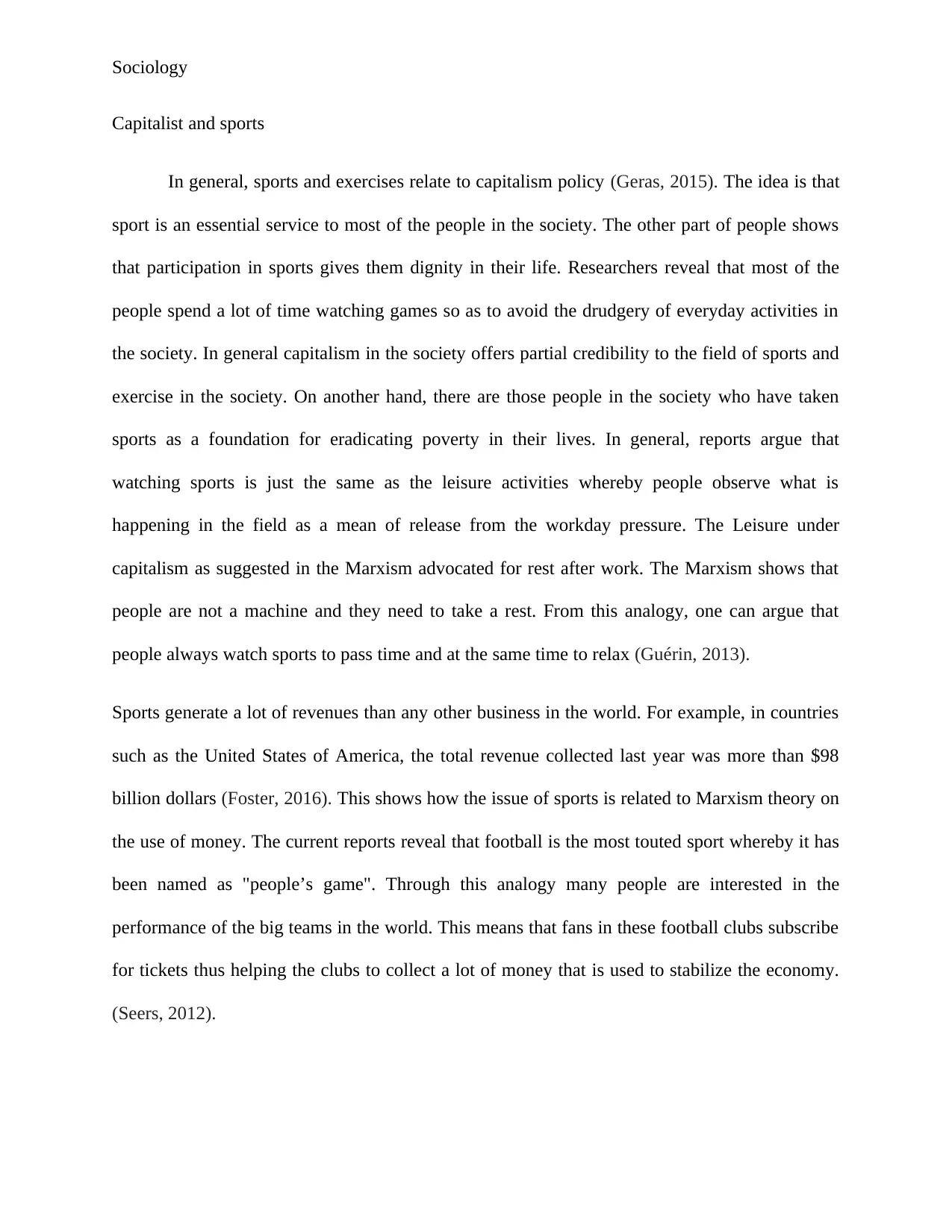
Sociology
Capitalist and sports
In general, sports and exercises relate to capitalism policy (Geras, 2015). The idea is that
sport is an essential service to most of the people in the society. The other part of people shows
that participation in sports gives them dignity in their life. Researchers reveal that most of the
people spend a lot of time watching games so as to avoid the drudgery of everyday activities in
the society. In general capitalism in the society offers partial credibility to the field of sports and
exercise in the society. On another hand, there are those people in the society who have taken
sports as a foundation for eradicating poverty in their lives. In general, reports argue that
watching sports is just the same as the leisure activities whereby people observe what is
happening in the field as a mean of release from the workday pressure. The Leisure under
capitalism as suggested in the Marxism advocated for rest after work. The Marxism shows that
people are not a machine and they need to take a rest. From this analogy, one can argue that
people always watch sports to pass time and at the same time to relax (Guérin, 2013).
Sports generate a lot of revenues than any other business in the world. For example, in countries
such as the United States of America, the total revenue collected last year was more than $98
billion dollars (Foster, 2016). This shows how the issue of sports is related to Marxism theory on
the use of money. The current reports reveal that football is the most touted sport whereby it has
been named as "people’s game". Through this analogy many people are interested in the
performance of the big teams in the world. This means that fans in these football clubs subscribe
for tickets thus helping the clubs to collect a lot of money that is used to stabilize the economy.
(Seers, 2012).
Capitalist and sports
In general, sports and exercises relate to capitalism policy (Geras, 2015). The idea is that
sport is an essential service to most of the people in the society. The other part of people shows
that participation in sports gives them dignity in their life. Researchers reveal that most of the
people spend a lot of time watching games so as to avoid the drudgery of everyday activities in
the society. In general capitalism in the society offers partial credibility to the field of sports and
exercise in the society. On another hand, there are those people in the society who have taken
sports as a foundation for eradicating poverty in their lives. In general, reports argue that
watching sports is just the same as the leisure activities whereby people observe what is
happening in the field as a mean of release from the workday pressure. The Leisure under
capitalism as suggested in the Marxism advocated for rest after work. The Marxism shows that
people are not a machine and they need to take a rest. From this analogy, one can argue that
people always watch sports to pass time and at the same time to relax (Guérin, 2013).
Sports generate a lot of revenues than any other business in the world. For example, in countries
such as the United States of America, the total revenue collected last year was more than $98
billion dollars (Foster, 2016). This shows how the issue of sports is related to Marxism theory on
the use of money. The current reports reveal that football is the most touted sport whereby it has
been named as "people’s game". Through this analogy many people are interested in the
performance of the big teams in the world. This means that fans in these football clubs subscribe
for tickets thus helping the clubs to collect a lot of money that is used to stabilize the economy.
(Seers, 2012).
Paraphrase This Document
Need a fresh take? Get an instant paraphrase of this document with our AI Paraphraser
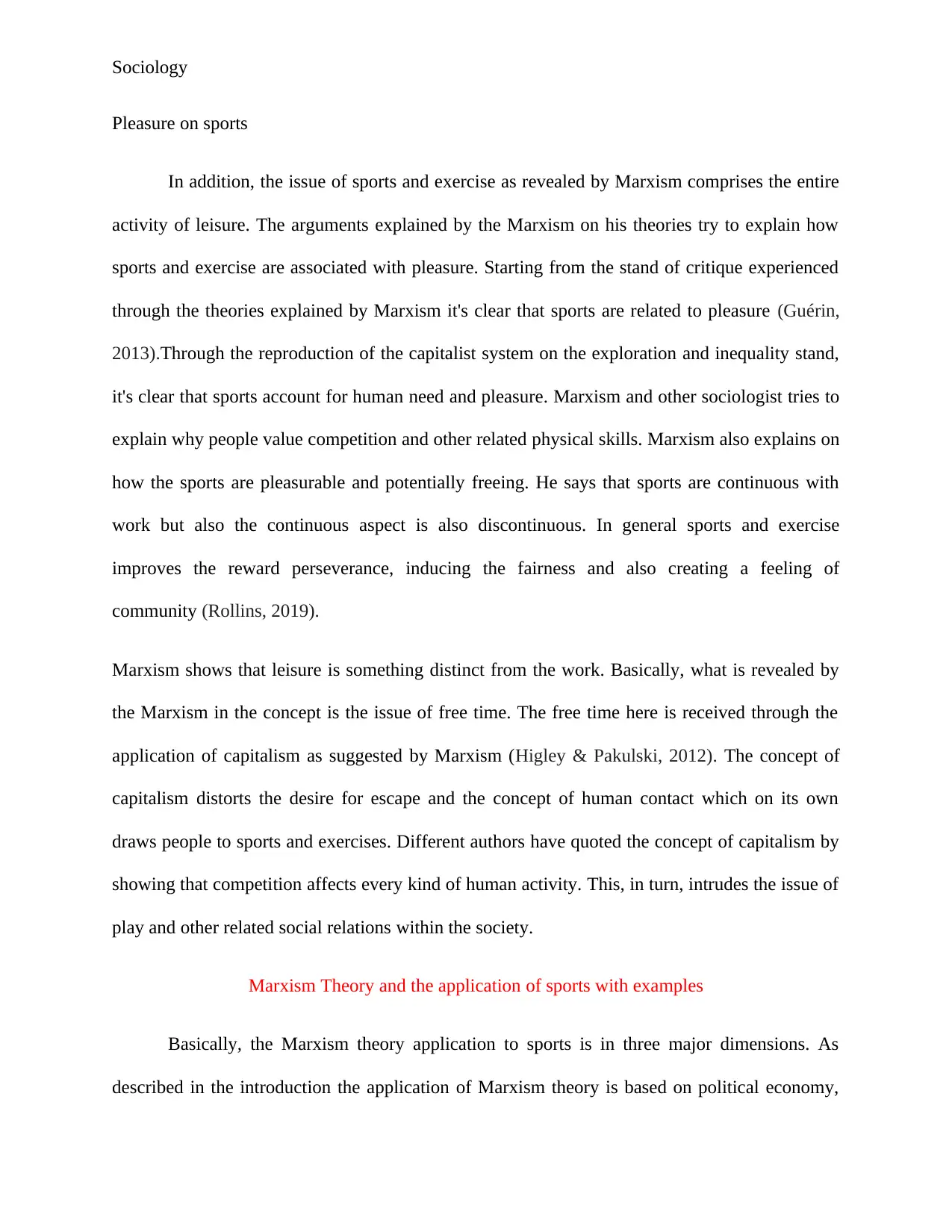
Sociology
Pleasure on sports
In addition, the issue of sports and exercise as revealed by Marxism comprises the entire
activity of leisure. The arguments explained by the Marxism on his theories try to explain how
sports and exercise are associated with pleasure. Starting from the stand of critique experienced
through the theories explained by Marxism it's clear that sports are related to pleasure (Guérin,
2013).Through the reproduction of the capitalist system on the exploration and inequality stand,
it's clear that sports account for human need and pleasure. Marxism and other sociologist tries to
explain why people value competition and other related physical skills. Marxism also explains on
how the sports are pleasurable and potentially freeing. He says that sports are continuous with
work but also the continuous aspect is also discontinuous. In general sports and exercise
improves the reward perseverance, inducing the fairness and also creating a feeling of
community (Rollins, 2019).
Marxism shows that leisure is something distinct from the work. Basically, what is revealed by
the Marxism in the concept is the issue of free time. The free time here is received through the
application of capitalism as suggested by Marxism (Higley & Pakulski, 2012). The concept of
capitalism distorts the desire for escape and the concept of human contact which on its own
draws people to sports and exercises. Different authors have quoted the concept of capitalism by
showing that competition affects every kind of human activity. This, in turn, intrudes the issue of
play and other related social relations within the society.
Marxism Theory and the application of sports with examples
Basically, the Marxism theory application to sports is in three major dimensions. As
described in the introduction the application of Marxism theory is based on political economy,
Pleasure on sports
In addition, the issue of sports and exercise as revealed by Marxism comprises the entire
activity of leisure. The arguments explained by the Marxism on his theories try to explain how
sports and exercise are associated with pleasure. Starting from the stand of critique experienced
through the theories explained by Marxism it's clear that sports are related to pleasure (Guérin,
2013).Through the reproduction of the capitalist system on the exploration and inequality stand,
it's clear that sports account for human need and pleasure. Marxism and other sociologist tries to
explain why people value competition and other related physical skills. Marxism also explains on
how the sports are pleasurable and potentially freeing. He says that sports are continuous with
work but also the continuous aspect is also discontinuous. In general sports and exercise
improves the reward perseverance, inducing the fairness and also creating a feeling of
community (Rollins, 2019).
Marxism shows that leisure is something distinct from the work. Basically, what is revealed by
the Marxism in the concept is the issue of free time. The free time here is received through the
application of capitalism as suggested by Marxism (Higley & Pakulski, 2012). The concept of
capitalism distorts the desire for escape and the concept of human contact which on its own
draws people to sports and exercises. Different authors have quoted the concept of capitalism by
showing that competition affects every kind of human activity. This, in turn, intrudes the issue of
play and other related social relations within the society.
Marxism Theory and the application of sports with examples
Basically, the Marxism theory application to sports is in three major dimensions. As
described in the introduction the application of Marxism theory is based on political economy,
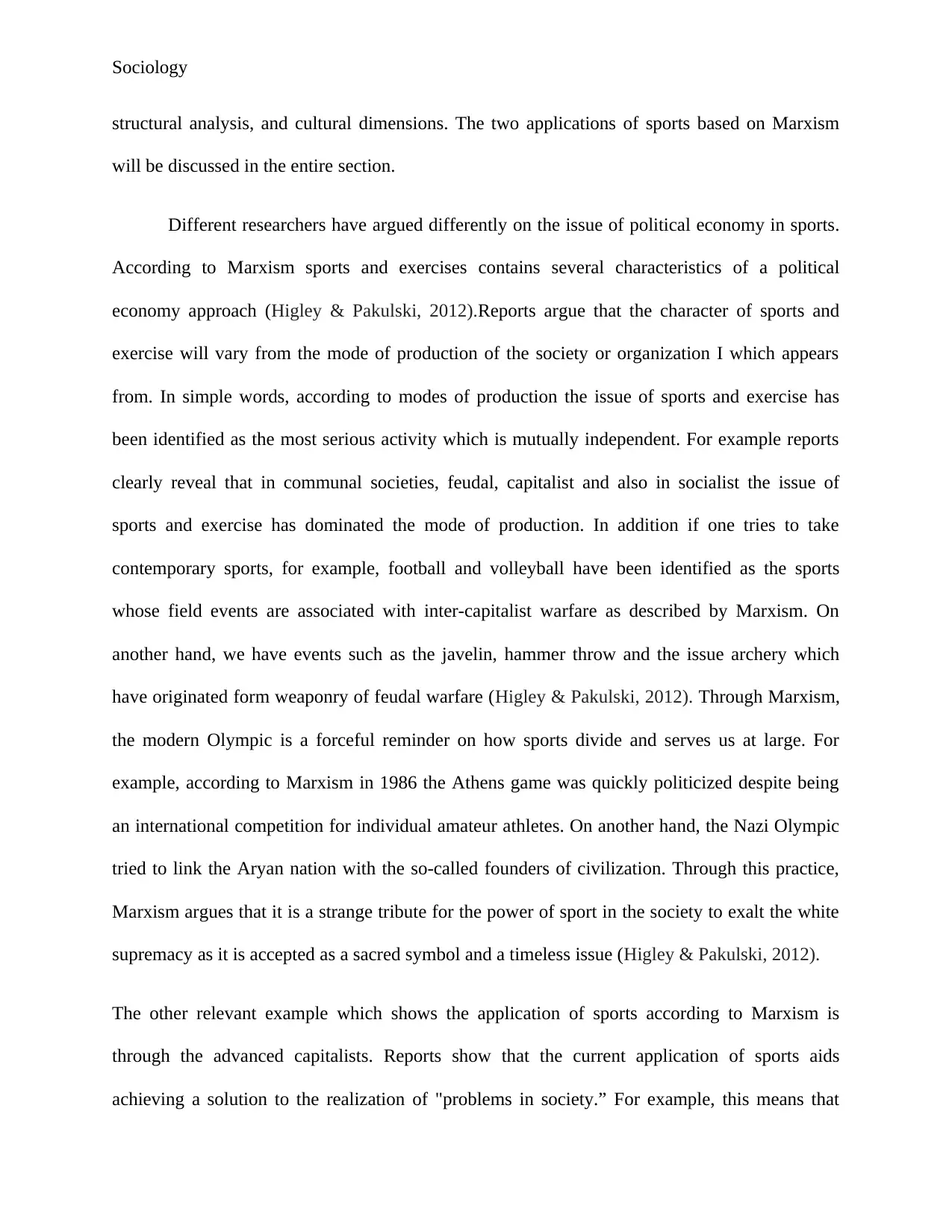
Sociology
structural analysis, and cultural dimensions. The two applications of sports based on Marxism
will be discussed in the entire section.
Different researchers have argued differently on the issue of political economy in sports.
According to Marxism sports and exercises contains several characteristics of a political
economy approach (Higley & Pakulski, 2012).Reports argue that the character of sports and
exercise will vary from the mode of production of the society or organization I which appears
from. In simple words, according to modes of production the issue of sports and exercise has
been identified as the most serious activity which is mutually independent. For example reports
clearly reveal that in communal societies, feudal, capitalist and also in socialist the issue of
sports and exercise has dominated the mode of production. In addition if one tries to take
contemporary sports, for example, football and volleyball have been identified as the sports
whose field events are associated with inter-capitalist warfare as described by Marxism. On
another hand, we have events such as the javelin, hammer throw and the issue archery which
have originated form weaponry of feudal warfare (Higley & Pakulski, 2012). Through Marxism,
the modern Olympic is a forceful reminder on how sports divide and serves us at large. For
example, according to Marxism in 1986 the Athens game was quickly politicized despite being
an international competition for individual amateur athletes. On another hand, the Nazi Olympic
tried to link the Aryan nation with the so-called founders of civilization. Through this practice,
Marxism argues that it is a strange tribute for the power of sport in the society to exalt the white
supremacy as it is accepted as a sacred symbol and a timeless issue (Higley & Pakulski, 2012).
The other relevant example which shows the application of sports according to Marxism is
through the advanced capitalists. Reports show that the current application of sports aids
achieving a solution to the realization of "problems in society.” For example, this means that
structural analysis, and cultural dimensions. The two applications of sports based on Marxism
will be discussed in the entire section.
Different researchers have argued differently on the issue of political economy in sports.
According to Marxism sports and exercises contains several characteristics of a political
economy approach (Higley & Pakulski, 2012).Reports argue that the character of sports and
exercise will vary from the mode of production of the society or organization I which appears
from. In simple words, according to modes of production the issue of sports and exercise has
been identified as the most serious activity which is mutually independent. For example reports
clearly reveal that in communal societies, feudal, capitalist and also in socialist the issue of
sports and exercise has dominated the mode of production. In addition if one tries to take
contemporary sports, for example, football and volleyball have been identified as the sports
whose field events are associated with inter-capitalist warfare as described by Marxism. On
another hand, we have events such as the javelin, hammer throw and the issue archery which
have originated form weaponry of feudal warfare (Higley & Pakulski, 2012). Through Marxism,
the modern Olympic is a forceful reminder on how sports divide and serves us at large. For
example, according to Marxism in 1986 the Athens game was quickly politicized despite being
an international competition for individual amateur athletes. On another hand, the Nazi Olympic
tried to link the Aryan nation with the so-called founders of civilization. Through this practice,
Marxism argues that it is a strange tribute for the power of sport in the society to exalt the white
supremacy as it is accepted as a sacred symbol and a timeless issue (Higley & Pakulski, 2012).
The other relevant example which shows the application of sports according to Marxism is
through the advanced capitalists. Reports show that the current application of sports aids
achieving a solution to the realization of "problems in society.” For example, this means that
⊘ This is a preview!⊘
Do you want full access?
Subscribe today to unlock all pages.

Trusted by 1+ million students worldwide
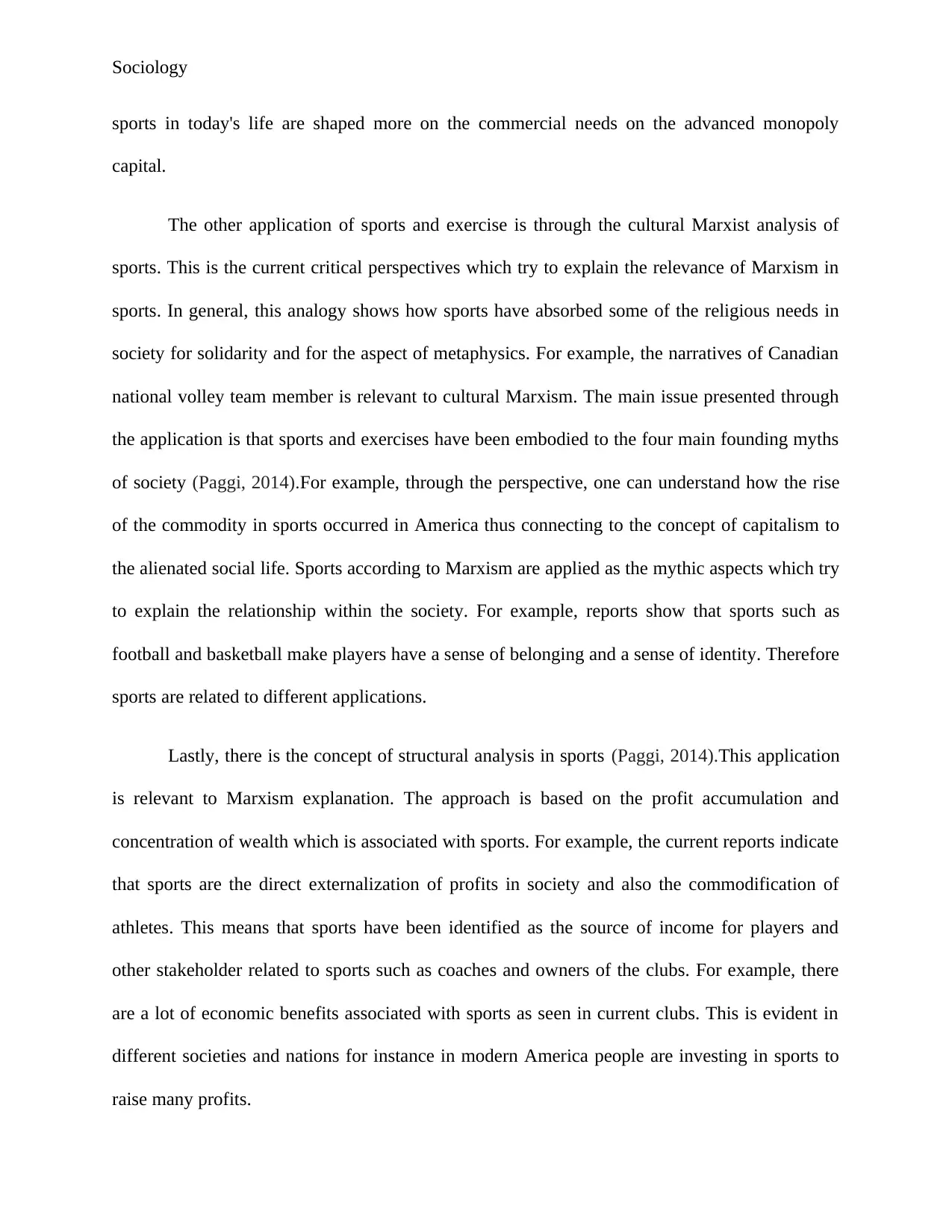
Sociology
sports in today's life are shaped more on the commercial needs on the advanced monopoly
capital.
The other application of sports and exercise is through the cultural Marxist analysis of
sports. This is the current critical perspectives which try to explain the relevance of Marxism in
sports. In general, this analogy shows how sports have absorbed some of the religious needs in
society for solidarity and for the aspect of metaphysics. For example, the narratives of Canadian
national volley team member is relevant to cultural Marxism. The main issue presented through
the application is that sports and exercises have been embodied to the four main founding myths
of society (Paggi, 2014).For example, through the perspective, one can understand how the rise
of the commodity in sports occurred in America thus connecting to the concept of capitalism to
the alienated social life. Sports according to Marxism are applied as the mythic aspects which try
to explain the relationship within the society. For example, reports show that sports such as
football and basketball make players have a sense of belonging and a sense of identity. Therefore
sports are related to different applications.
Lastly, there is the concept of structural analysis in sports (Paggi, 2014).This application
is relevant to Marxism explanation. The approach is based on the profit accumulation and
concentration of wealth which is associated with sports. For example, the current reports indicate
that sports are the direct externalization of profits in society and also the commodification of
athletes. This means that sports have been identified as the source of income for players and
other stakeholder related to sports such as coaches and owners of the clubs. For example, there
are a lot of economic benefits associated with sports as seen in current clubs. This is evident in
different societies and nations for instance in modern America people are investing in sports to
raise many profits.
sports in today's life are shaped more on the commercial needs on the advanced monopoly
capital.
The other application of sports and exercise is through the cultural Marxist analysis of
sports. This is the current critical perspectives which try to explain the relevance of Marxism in
sports. In general, this analogy shows how sports have absorbed some of the religious needs in
society for solidarity and for the aspect of metaphysics. For example, the narratives of Canadian
national volley team member is relevant to cultural Marxism. The main issue presented through
the application is that sports and exercises have been embodied to the four main founding myths
of society (Paggi, 2014).For example, through the perspective, one can understand how the rise
of the commodity in sports occurred in America thus connecting to the concept of capitalism to
the alienated social life. Sports according to Marxism are applied as the mythic aspects which try
to explain the relationship within the society. For example, reports show that sports such as
football and basketball make players have a sense of belonging and a sense of identity. Therefore
sports are related to different applications.
Lastly, there is the concept of structural analysis in sports (Paggi, 2014).This application
is relevant to Marxism explanation. The approach is based on the profit accumulation and
concentration of wealth which is associated with sports. For example, the current reports indicate
that sports are the direct externalization of profits in society and also the commodification of
athletes. This means that sports have been identified as the source of income for players and
other stakeholder related to sports such as coaches and owners of the clubs. For example, there
are a lot of economic benefits associated with sports as seen in current clubs. This is evident in
different societies and nations for instance in modern America people are investing in sports to
raise many profits.
Paraphrase This Document
Need a fresh take? Get an instant paraphrase of this document with our AI Paraphraser
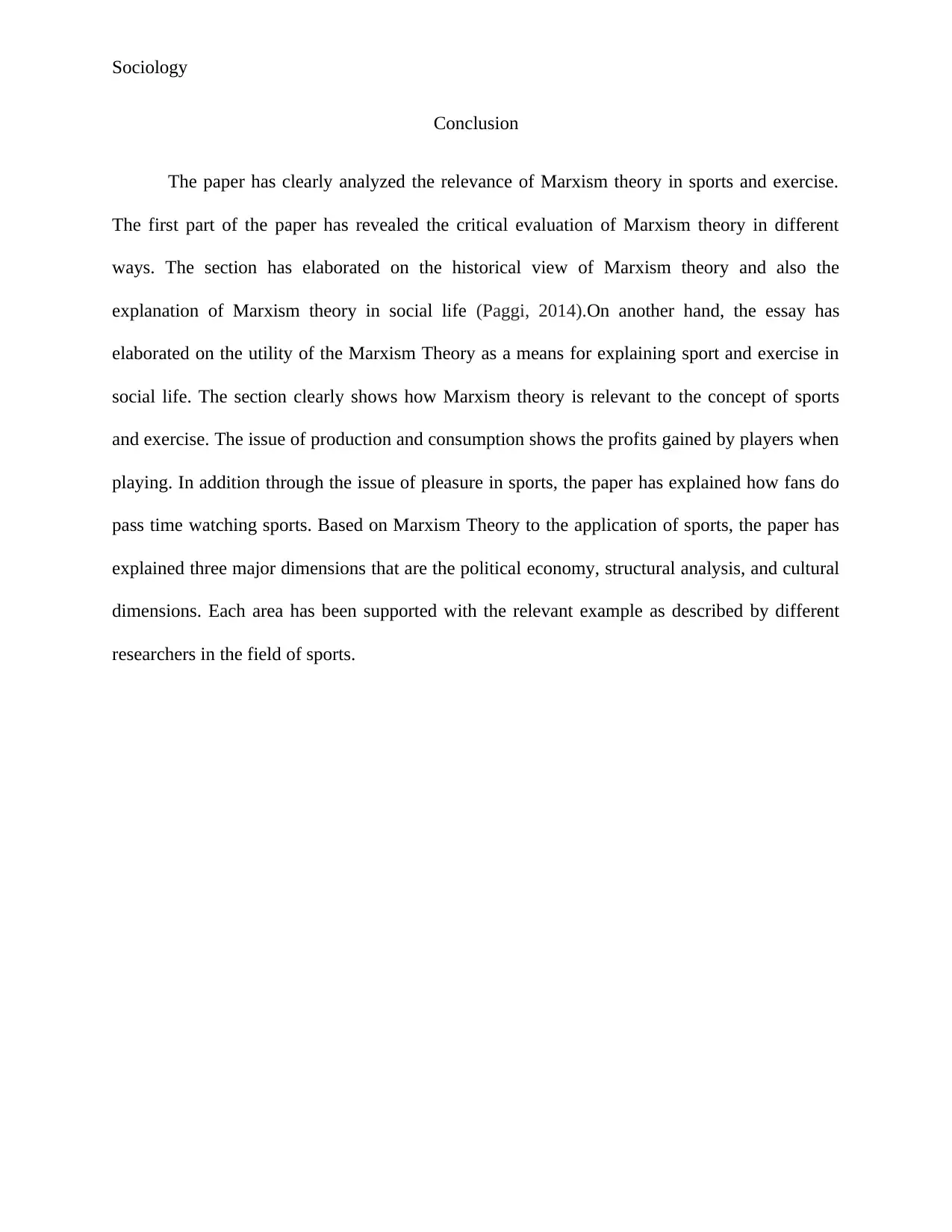
Sociology
Conclusion
The paper has clearly analyzed the relevance of Marxism theory in sports and exercise.
The first part of the paper has revealed the critical evaluation of Marxism theory in different
ways. The section has elaborated on the historical view of Marxism theory and also the
explanation of Marxism theory in social life (Paggi, 2014).On another hand, the essay has
elaborated on the utility of the Marxism Theory as a means for explaining sport and exercise in
social life. The section clearly shows how Marxism theory is relevant to the concept of sports
and exercise. The issue of production and consumption shows the profits gained by players when
playing. In addition through the issue of pleasure in sports, the paper has explained how fans do
pass time watching sports. Based on Marxism Theory to the application of sports, the paper has
explained three major dimensions that are the political economy, structural analysis, and cultural
dimensions. Each area has been supported with the relevant example as described by different
researchers in the field of sports.
Conclusion
The paper has clearly analyzed the relevance of Marxism theory in sports and exercise.
The first part of the paper has revealed the critical evaluation of Marxism theory in different
ways. The section has elaborated on the historical view of Marxism theory and also the
explanation of Marxism theory in social life (Paggi, 2014).On another hand, the essay has
elaborated on the utility of the Marxism Theory as a means for explaining sport and exercise in
social life. The section clearly shows how Marxism theory is relevant to the concept of sports
and exercise. The issue of production and consumption shows the profits gained by players when
playing. In addition through the issue of pleasure in sports, the paper has explained how fans do
pass time watching sports. Based on Marxism Theory to the application of sports, the paper has
explained three major dimensions that are the political economy, structural analysis, and cultural
dimensions. Each area has been supported with the relevant example as described by different
researchers in the field of sports.
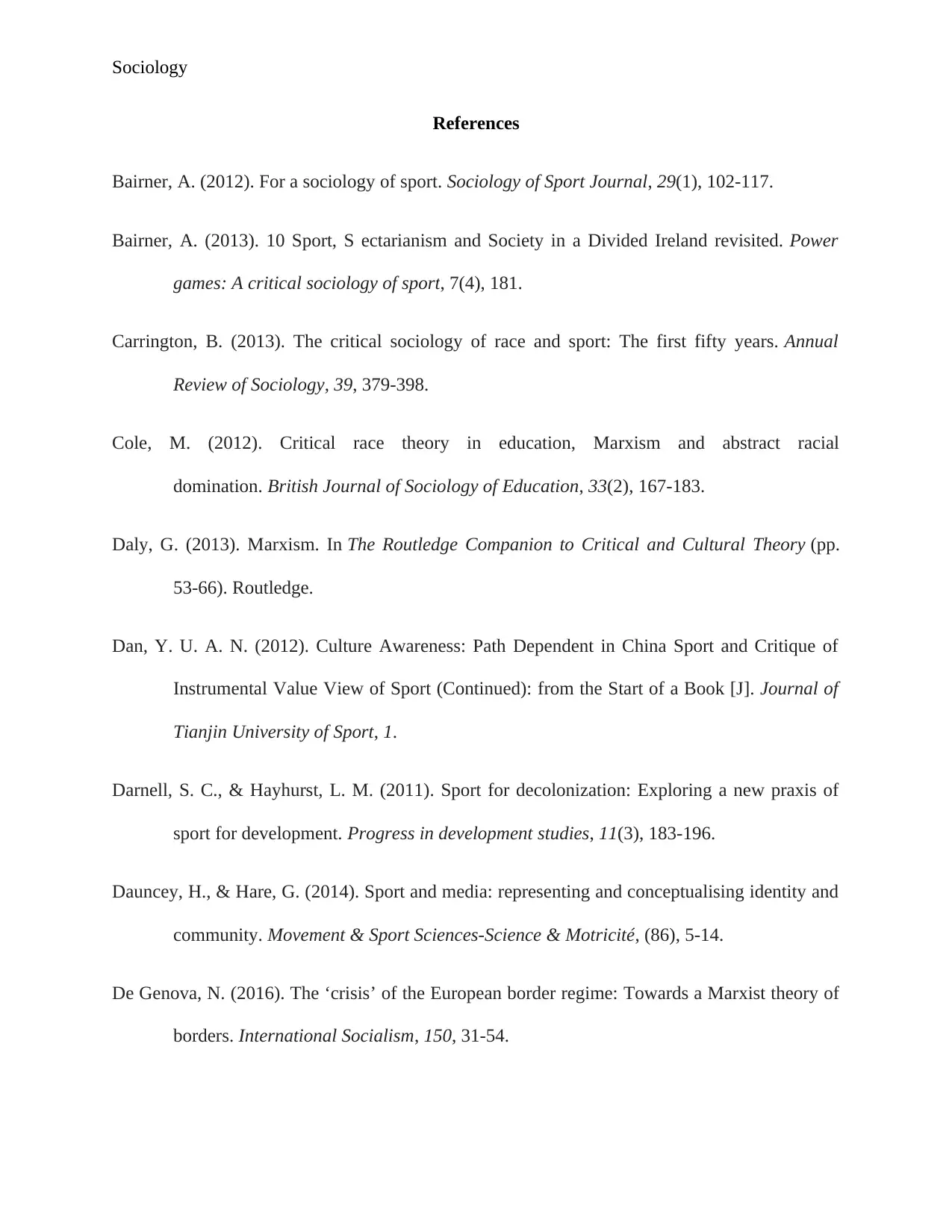
Sociology
References
Bairner, A. (2012). For a sociology of sport. Sociology of Sport Journal, 29(1), 102-117.
Bairner, A. (2013). 10 Sport, S ectarianism and Society in a Divided Ireland revisited. Power
games: A critical sociology of sport, 7(4), 181.
Carrington, B. (2013). The critical sociology of race and sport: The first fifty years. Annual
Review of Sociology, 39, 379-398.
Cole, M. (2012). Critical race theory in education, Marxism and abstract racial
domination. British Journal of Sociology of Education, 33(2), 167-183.
Daly, G. (2013). Marxism. In The Routledge Companion to Critical and Cultural Theory (pp.
53-66). Routledge.
Dan, Y. U. A. N. (2012). Culture Awareness: Path Dependent in China Sport and Critique of
Instrumental Value View of Sport (Continued): from the Start of a Book [J]. Journal of
Tianjin University of Sport, 1.
Darnell, S. C., & Hayhurst, L. M. (2011). Sport for decolonization: Exploring a new praxis of
sport for development. Progress in development studies, 11(3), 183-196.
Dauncey, H., & Hare, G. (2014). Sport and media: representing and conceptualising identity and
community. Movement & Sport Sciences-Science & Motricité, (86), 5-14.
De Genova, N. (2016). The ‘crisis’ of the European border regime: Towards a Marxist theory of
borders. International Socialism, 150, 31-54.
References
Bairner, A. (2012). For a sociology of sport. Sociology of Sport Journal, 29(1), 102-117.
Bairner, A. (2013). 10 Sport, S ectarianism and Society in a Divided Ireland revisited. Power
games: A critical sociology of sport, 7(4), 181.
Carrington, B. (2013). The critical sociology of race and sport: The first fifty years. Annual
Review of Sociology, 39, 379-398.
Cole, M. (2012). Critical race theory in education, Marxism and abstract racial
domination. British Journal of Sociology of Education, 33(2), 167-183.
Daly, G. (2013). Marxism. In The Routledge Companion to Critical and Cultural Theory (pp.
53-66). Routledge.
Dan, Y. U. A. N. (2012). Culture Awareness: Path Dependent in China Sport and Critique of
Instrumental Value View of Sport (Continued): from the Start of a Book [J]. Journal of
Tianjin University of Sport, 1.
Darnell, S. C., & Hayhurst, L. M. (2011). Sport for decolonization: Exploring a new praxis of
sport for development. Progress in development studies, 11(3), 183-196.
Dauncey, H., & Hare, G. (2014). Sport and media: representing and conceptualising identity and
community. Movement & Sport Sciences-Science & Motricité, (86), 5-14.
De Genova, N. (2016). The ‘crisis’ of the European border regime: Towards a Marxist theory of
borders. International Socialism, 150, 31-54.
⊘ This is a preview!⊘
Do you want full access?
Subscribe today to unlock all pages.

Trusted by 1+ million students worldwide
1 out of 14
Related Documents
Your All-in-One AI-Powered Toolkit for Academic Success.
+13062052269
info@desklib.com
Available 24*7 on WhatsApp / Email
![[object Object]](/_next/static/media/star-bottom.7253800d.svg)
Unlock your academic potential
Copyright © 2020–2026 A2Z Services. All Rights Reserved. Developed and managed by ZUCOL.




